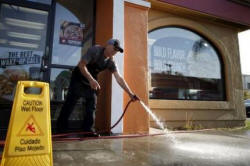|
 In
drought-stricken California, cities push back against steep water cuts In
drought-stricken California, cities push back against steep water cuts
 Send a link to a friend
Send a link to a friend
[April 16, 2015]
By Sharon Bernstein
SACRAMENTO, Calif. (Reuters) - Cities set
to feel the brunt of California's mandated cutbacks in water use pushed
back on Wednesday, calling a plan by regulators to demand reductions of
as much as 35 percent in some communities unfair.
|
|
 Water utilities in the areas surrounding the state capital of
Sacramento, in line to face steep rationing despite years of
conservation said factors such as leaks in the delivery system from
streams and reservoirs, and the needs of big local water consumers
like prisons and hospitals should be considered before a region was
penalized. Water utilities in the areas surrounding the state capital of
Sacramento, in line to face steep rationing despite years of
conservation said factors such as leaks in the delivery system from
streams and reservoirs, and the needs of big local water consumers
like prisons and hospitals should be considered before a region was
penalized.
"I am not against severe conservation," said Rob Roscoe, General
Manager of the Sacramento Suburban Water District, which serves
about 173,000 people in Sacramento's northeastern suburbs. "But I
want everybody playing from the same rulebook."
Earlier this month, California Governor Jerry Brown, standing in a
dry mountain meadow that in a typical year would have been covered
with five feet of snow, ordered a 25-percent statewide reduction in
water use for urban areas.

In order to reach that goal, Brown said, cities that already used
less water than others would suffer smaller cutbacks, while those
who used more per capital would have to reduce their usage by a
higher amount.
His order, as a devastating drought moved into its fourth year,
created the first statewide mandatory water rationing in California
history.
Last week, the State Water Resources Control Board released a basic
framework to meet that goal by forcing cutbacks of up to 35 percent
of water use for communities that use higher amounts of water per
person.
But those communities say the proposed rules are not based on a fair
reading of how much water they use.
[to top of second column] |

For example, the calculation does not consider whether the
communities were using water that they had banked for their own use
so that their residents wouldn't have to worry about running low,
Roscoe said.
It also doesn't consider the environment where a community is
located, or how fast the water that is used outdoors evaporates, the
trade organization representing the state's water utilities said in
a letter submitted to regulators and released on Wednesday.
The plan also doesn't give communities credit if they return clean
water to local aquifers and streams.
Cities also complained that their economies could be hurt if
businesses that use a lot of water to process food are penalized.
(Reporting by Sharon Bernstein)
[© 2015 Thomson Reuters. All rights
reserved.]
Copyright 2015 Reuters. All rights reserved. This material may not be published,
broadcast, rewritten or redistributed.
 |